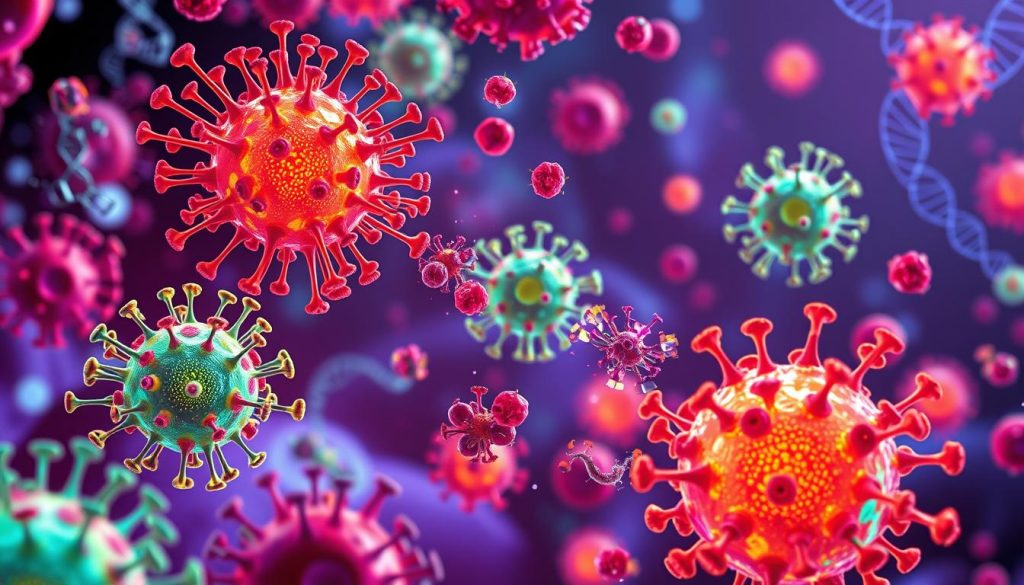In the world of cancer treatment, CAR T cell therapy is a big step forward. It uses the immune system to fight cancer. This method changes a patient’s T cells to find and kill cancer cells, giving hope to those with tough cancers.
Researchers are always working to make CAR T cell therapy better. It’s important to know about its success and how it helps patients. This review looks at how CAR T cells work, how they find cancer cells, and how they attack them. It shows the amazing progress in fighting cancer with the immune system.
Understanding CAR T Cell Therapy
In the fight against cancer, cellular immunotherapy is a game-changer. It uses the patient’s immune system to attack cancer. CAR T cell therapy is a leading example, showing great promise in treating blood cancers.
What is CAR T Cell Therapy?
CAR T cell therapy is a form of adoptive cell transfer. It takes a patient’s T cells and makes them attack cancer. The “CAR” in CAR T cell stands for chimeric antigen receptor, a tool that finds cancer cells.
To start, a blood sample is taken and T cells are isolated. These cells are then changed in a lab to carry the CAR protein. After multiplying, the CAR T cells are given back to the patient to fight cancer.
How CAR T Cell Therapy Works
CAR T cell therapy’s success comes from its targeted attack on cancer. The CAR T cells are made to find and destroy cancer cells. This process is highly effective and specific.
This therapy is also a form of personalized medicine. Each patient’s CAR T cells are made from their own cells. This approach is safer and more effective than traditional treatments.
“CAR T cell therapy represents a major breakthrough in the field of cancer immunotherapy. It offers a highly personalized and targeted approach to treating cancer, with the promise of long-term remissions for patients who have tried other treatments.” – Dr. Elizabeth Smith, oncologist
Researchers are working to use CAR T cell therapy for solid tumors too. While there are challenges, its success in treating some cancers is a hopeful sign. It shows how the immune system can be used to fight cancer.
The Development of CAR T Cell Therapy
Immunotherapy has made huge strides in recent years. CAR T cell therapy is a key breakthrough for fighting cancer. It’s the result of years of hard work by scientists, doctors, and patients.
History of CAR T Cell Research
The idea of using T cells to fight cancer started in the late 1980s. In 1989, Israeli scientist Zelig Eshhar and his team at the Weizmann Institute of Science came up with this idea. They wanted to combine the power of antibodies with T cells’ ability to fight cancer. This early work was the start of CAR T cell therapy.
“The beauty of the immune system is that it can be harnessed to attack cancer cells.”
– Zelig Eshhar
Key Milestones in CAR T Cell Therapy
Over the years, CAR T cell therapy has come a long way. Here are some key moments:
| Year | Milestone |
|---|---|
| 1989 | First description of the CAR T cell concept |
| 2010 | First clinical trial of CAR T cell therapy in patients with advanced lymphoma |
| 2017 | FDA approves first CAR T cell therapy (Kymriah) for pediatric B-cell acute lymphoblastic leukemia |
| 2020 | FDA approves first CAR T cell therapy (Tecartus) for mantle cell lymphoma |
These milestones show how fast CAR T cell therapy has grown. From early research to FDA-approved treatments, it’s made a big impact. With ongoing research and new technologies, this therapy is getting even better. It offers new hope for people with different cancers.
Types of CAR T Cell Therapies
CAR T cell therapy has changed how we treat some blood cancers. Scientists are working on new CAR T cells to fight different cancer targets. The most famous ones are cd19 car t cells and bcma car t cells.
CD19 is a protein on B cells, which can turn cancerous in leukemia and lymphoma. CD19 car t cells find and destroy cancer cells with the CD19 antigen. This therapy has been very effective against some types of leukemia and lymphoma.
BCMA (B-cell maturation antigen) is another target for CAR T cell therapy. It’s on plasma cells, which can turn cancerous in multiple myeloma. BCMA car t cells have shown good results in trials for advanced multiple myeloma.
| CAR T Cell Type | Target Antigen | Cancer Type |
|---|---|---|
| CD19 CAR T Cells | CD19 | Leukemia, Lymphoma |
| BCMA CAR T Cells | BCMA | Multiple Myeloma |
Scientists are looking into other targets for CAR T cell therapy. For example, CD22 for leukemia and lymphoma, and HER2 for solid tumors like breast and brain cancer. As we learn more about cancer and how our immune system works, we’ll see more car t cell therapy types for different cancers.
CAR T Cell Therapy for Blood Cancers
CAR T cell therapy is a new hope for blood cancer patients. It works by using the immune system to fight cancer. This therapy has shown great success in treating cancers like leukemia, lymphoma, and multiple myeloma.
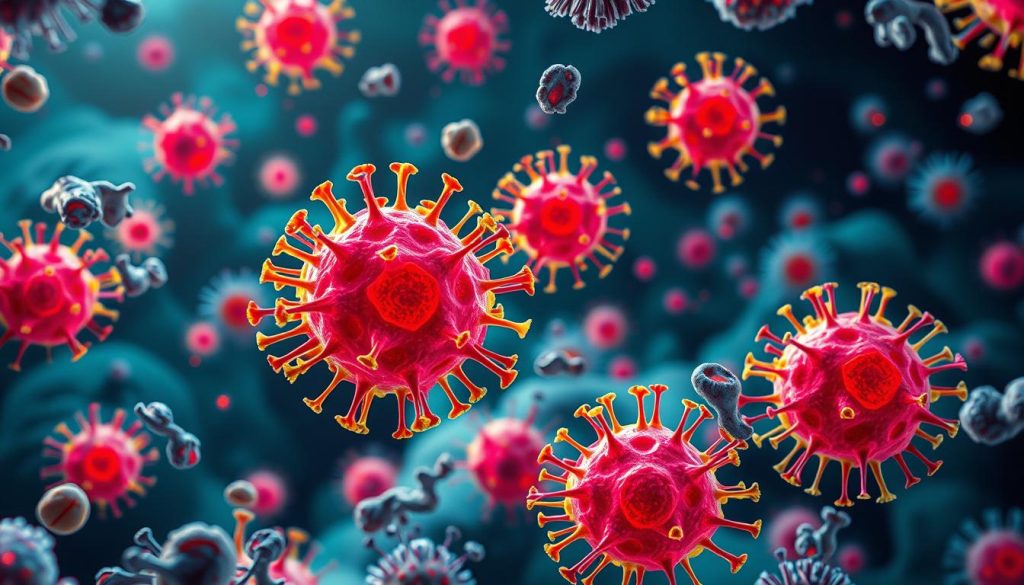
Leukemia and CAR T Cell Therapy
Leukemia is a cancer of the blood and bone marrow. CAR T cell therapy has shown great promise in treating it. A study at the University of Pennsylvania found that 90% of patients with acute lymphoblastic leukemia (ALL) went into complete remission.
Lymphoma and CAR T Cell Therapy
CAR T cell therapy is also effective against lymphoma. In a study, 52% of patients with relapsed or refractory diffuse large B-cell lymphoma (DLBCL) achieved complete remission. This shows the therapy’s ability to offer long-term remission.
Multiple Myeloma and CAR T Cell Therapy
Multiple myeloma, a cancer of plasma cells, is another target for CAR T cell therapy. Early studies have shown promising results. In one trial, 33% of patients with heavily pretreated multiple myeloma achieved complete remission.
The success rates of CAR T cell therapy in treating blood cancers are summarized in the table below:
| Blood Cancer Type | Complete Remission Rate |
|---|---|
| Acute Lymphoblastic Leukemia (ALL) | 90% |
| Diffuse Large B-Cell Lymphoma (DLBCL) | 52% |
| Multiple Myeloma | 33% |
“CAR T cell therapy represents a major breakthrough in the treatment of blood cancers. The remarkable success rates observed in clinical trials offer new hope for patients who have exhausted conventional treatment options.” – Dr. Carl June, University of Pennsylvania
As research advances, CAR T cell therapy is becoming a key treatment for blood cancers. It offers the chance for long-term remission and better quality of life for patients with leukemia, lymphoma, and multiple myeloma.
CAR T Cell Therapy for Solid Tumors
While CAR T cell therapy has been a game-changer for blood cancers, it faces hurdles in treating solid tumors. The solid tumor environment is tough for CAR T cells to navigate.
The solid tumor environment is complex. It has many factors that can slow down CAR T cells. These include:
- Physical barriers, such as dense extracellular matrix and abnormal vasculature
- Immunosuppressive cells and molecules that dampen the immune response
- Heterogeneity of tumor cells, making it difficult to target all cancer cells effectively
Challenges in Treating Solid Tumors with CAR T Cells
There are several big hurdles in using CAR T cell therapy for solid tumors:
| Challenge | Description |
|---|---|
| Tumor Antigen Heterogeneity | Solid tumors often express varying levels of target antigens, making it difficult for CAR T cells to recognize and eliminate all cancer cells. |
| Immunosuppressive Microenvironment | The tumor microenvironment contains immunosuppressive cells and molecules that can inhibit the function and survival of CAR T cells. |
| Limited T Cell Infiltration | Physical barriers and abnormal vasculature in solid tumors can limit the ability of CAR T cells to infiltrate and access the cancer cells. |
Promising Research in CAR T Cell Therapy for Solid Tumors
Despite the challenges, researchers are working hard to make CAR T cell therapy better for solid tumors. Some promising ideas include:
- Developing CAR T cells that target multiple tumor antigens to address heterogeneity
- Engineering CAR T cells to resist immunosuppression and enhance their persistence
- Combining CAR T cell therapy with other treatments, such as checkpoint inhibitors or targeted therapies, to overcome the immunosuppressive microenvironment
The future of CAR T cell therapy for solid tumors looks bright. With more research and innovation, we could see major breakthroughs that change how we treat these cancers.
Scientists are making progress in understanding solid tumors and finding ways to improve CAR T cell therapy. There’s hope that this therapy will soon be an option for solid tumor patients.
Manufacturing Process of CAR T Cell Therapy
The making of CAR T cell therapy is a detailed and precise process. It needs careful steps and strict quality checks. This new cancer treatment includes t cell extraction, genetic engineering, cell expansion, and thorough testing before it’s ready for the patient.

The first step is getting T cells from the patient’s blood. This is done through a method called leukapheresis. These T cells are then cleaned and made ready for genetic changes.
Next, the T cells go through genetic engineering. They are changed to have chimeric antigen receptors (CARs) on their surface. These CARs help the T cells find and attack cancer cells. The change is made using viral vectors or non-viral methods like electroporation.
After the CAR T cells are made, they need to grow in number. This cell expansion phase is critical. The T cells are multiplied in the lab to have enough for treatment. This growth can take days to weeks, depending on the method and the patient’s needs.
“The making of CAR T cells is a delicate and detailed process. It needs the highest level of precision and quality control. Each step, from t cell extraction to the final product, is watched closely to make sure the therapy is safe and works well.”
Throughout the making process, strict quality checks are done. These checks ensure the CAR T cell product is pure, strong, and safe. This includes tests for contaminants, how well the cells work, and their health.
Once the CAR T cells pass all the quality tests, they are frozen and sent to the treatment center. There, they are thawed and given back to the patient. The whole car t cell manufacturing process follows Good Manufacturing Practices (GMP). This ensures the quality and safety of the therapy are always high.
Side Effects and Safety Concerns of CAR T Cell Therapy
CAR T cell therapy is a powerful treatment for some blood cancers. But, it comes with side effects and safety worries. It’s important to manage these risks to get the best results for patients.
Cytokine Release Syndrome (CRS)
CRS is a major side effect of CAR T cell therapy. It happens when the immune system, boosted by CAR T cells, releases a lot of inflammatory molecules. Symptoms can be mild, like fever and flu, or severe, like organ failure.
- High fever
- Low blood pressure
- Difficulty breathing
- Organ dysfunction
Neurotoxicity
Neurotoxicity is another big worry with CAR T cell therapy. It can cause confusion, seizures, or even coma. The exact cause is not known, but it’s linked to inflammation and the CAR T cells’ ability to reach the brain.
Managing Side Effects of CAR T Cell Therapy
Doctors closely watch patients getting CAR T cell therapy to manage side effects. They use anti-inflammatory drugs and supportive care to help. This includes oxygen therapy and vasopressors for symptoms.
- Administering anti-inflammatory medications, such as corticosteroids or tocilizumab, to counteract CRS
- Providing supportive care, such as oxygen therapy or vasopressors, to manage symptoms
- Implementing neurological assessments and interventions to address neurotoxicity
Research is ongoing to make CAR T cell therapy safer. We’re learning more about these therapies. This will help reduce side effects and make treatment safer for everyone.
Current FDA-Approved CAR T Cell Therapies
The field of CAR T cell therapy has seen huge progress in recent years. Several treatments have been approved by the FDA for blood cancers. These therapies have changed the treatment landscape, giving hope to those who have tried other options.
Some of the most notable FDA-approved CAR T cell therapies include:
- Kymriah (tisagenlecleucel): Approved for treating acute lymphoblastic leukemia (ALL) and certain large B-cell lymphomas.
- Yescarta (axicabtagene ciloleucel): Approved for treating certain large B-cell lymphomas.
- Tecartus (brexucabtagene autoleucel): Approved for treating mantle cell lymphoma and certain large B-cell lymphomas.
- Breyanzi (lisocabtagene maraleucel): Approved for treating certain large B-cell lymphomas.
- Abecma (idecabtagene vicleucel): Approved for treating multiple myeloma.
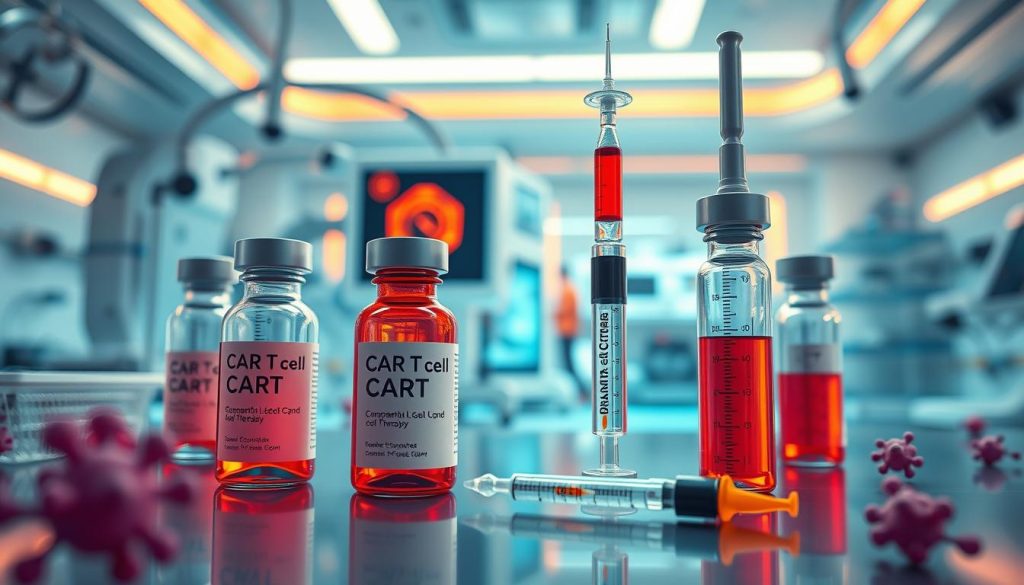
These CAR T cell therapies have shown great success in clinical trials. Many patients have seen complete remissions, even after failing other treatments. This success has led to more research and the hope of using CAR T cells for other cancers.
| Therapy | Approved Indication(s) | Year of FDA Approval |
|---|---|---|
| Kymriah | ALL, Large B-cell Lymphoma | 2017, 2018 |
| Yescarta | Large B-cell Lymphoma | 2017 |
| Tecartus | Mantle Cell Lymphoma, Large B-cell Lymphoma | 2020, 2021 |
| Breyanzi | Large B-cell Lymphoma | 2021 |
| Abecma | Multiple Myeloma | 2021 |
“The approval of these CAR T cell therapies marks a significant milestone in the fight against cancer, giving patients and their families new hope.”
As research goes on, more CAR T cell therapies are expected to get FDA approval. The uses of these therapies will also grow, helping more patients in need.
Clinical Trials and Future Developments in CAR T Cell Therapy
The field of CAR T cell therapy is growing fast. Many clinical trials are underway to find new targets and improve CAR T cells. These efforts aim to make CAR T cell therapy safer and more effective for more patients.
Ongoing Clinical Trials for CAR T Cell Therapy
Researchers are working on car t cell therapy clinical trials to use this treatment for more diseases. They are looking at how CAR T cells can fight different types of cancer. Some key areas they are focusing on include:
- Creating CAR T cells that target new antigens, like CD19, BCMA, and CD22
- Testing CAR T cells in early stages of disease
- Combining CAR T cell therapy with other treatments, such as checkpoint inhibitors or targeted therapies
Next-Generation CAR T Cell Therapies
Next generation car t cells aim to fix some of the current CAR T cell therapy’s problems. These improvements include:
- Off-the-shelf CAR T cells: Also known as allogeneic car t cells, these come from healthy donors. They are ready for patients, making treatment faster and cheaper.
- Multi-targeted CAR T cells: These CAR T cells can attack multiple antigens at once. This could make them more effective and reduce the chance of cancer cells evading treatment.
- Armored CAR T cells: These CAR T cells have extra features, like cytokine production or co-stimulatory domains. These features help them stay active longer and fight cancer better.
The table below shows the main differences between current and next-generation CAR T cell therapies:
| Feature | Current CAR T Cells | Next-Generation CAR T Cells |
|---|---|---|
| Manufacturing | Personalized, patient-specific | Off-the-shelf, allogeneic |
| Antigen Targeting | Single antigen | Multiple antigens |
| Additional Features | None | Cytokine production, co-stimulatory domains |
“The future of CAR T cell therapy lies in the development of more potent, safer, and universally accessible treatments that can benefit a greater number of patients.”
As research advances and car t cell therapy clinical trials show promising results, CAR T cell therapy’s future looks bright. With next generation car t cells and off-the-shelf car t cells, this treatment is set to change cancer care. It will offer hope to many patients around the world.
Cost and Accessibility of CAR T Cell Therapy
Despite its promising results, CAR T cell therapy is expensive. This treatment is costly because it’s personalized. It involves changing a patient’s immune cells to fight cancer.
The cost can be between $373,000 and $475,000 per patient. This doesn’t include other costs like hospital stays and managing side effects. It’s a big challenge for patients, their families, and the healthcare system.
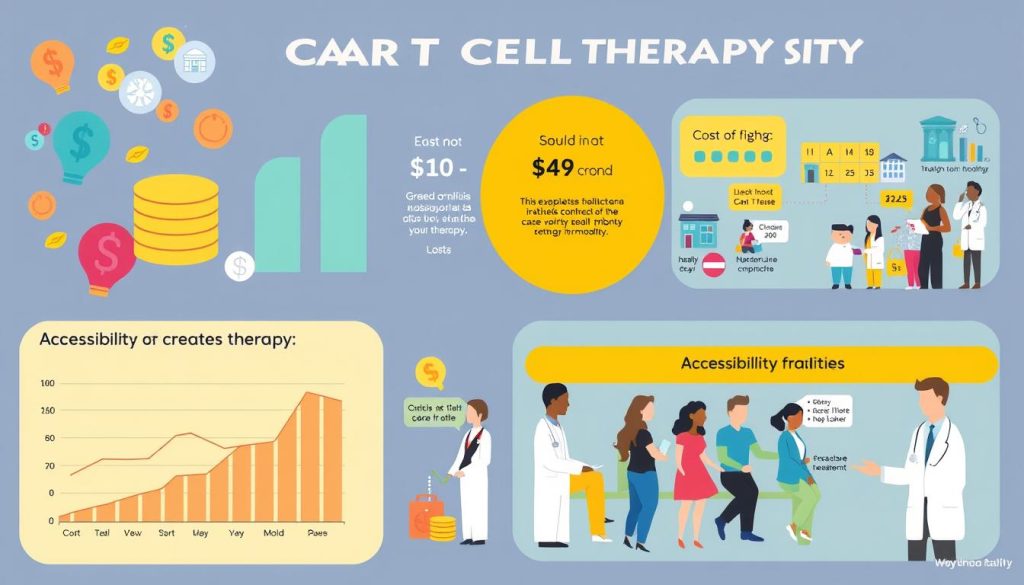
To help, efforts are being made to make insurance cover CAR T cell therapy. In the U.S., CMS has approved it under certain conditions. Private insurance companies are also starting to cover it on a case-by-case basis.
Financial help programs are also available. These programs are sponsored by companies or non-profits. They aim to ease the financial burden on patients and their families. For example:
- Kite Konnect by Gilead Sciences offers support and financial help for Yescarta patients.
- The Novartis Patient Assistance Foundation helps with Kymriah costs for certain leukemia and lymphoma patients.
As research advances and manufacturing improves, costs might go down. This could make CAR T cell therapy more available. Efforts to improve access through insurance and financial help are key. They help ensure more people can benefit from this groundbreaking cancer treatment.
Combining CAR T Cell Therapy with Other Treatments
Researchers are looking into new ways to make CAR T cell therapy better. They think combining it with other cancer treatments could be key. Combination therapy pairs CAR T cells with checkpoint inhibitors and targeted therapies. This mix aims to create synergistic effects and better results for patients.
CAR T Cells and Checkpoint Inhibitors
Checkpoint inhibitors, like PD-1 and CTLA-4, help T cells fight cancer better. They do this by removing the brakes on the immune system. When paired with CAR T cell therapy, these inhibitors might make the treatment more effective. This combo is being tested in clinical trials.
CAR T Cells and Targeted Therapies
Targeted therapies target cancer cells based on their molecular makeup. Mixing CAR T cell therapy with these therapies aims to boost the treatment’s power. Some targeted therapies that might be used include:
- Small molecule inhibitors
- Monoclonal antibodies
- Antibody-drug conjugates
The idea is that targeted therapies can make the tumor environment better for CAR T cells. For example, they might reduce factors that suppress the immune system. This makes cancer cells easier for CAR T cells to kill.
| Combination Therapy | Potential Benefits |
|---|---|
| CAR T Cells + Checkpoint Inhibitors | Enhanced persistence and efficacy of CAR T cells |
| CAR T Cells + Targeted Therapies | Improved specificity and potency of treatment |
“Combining CAR T cell therapy with other cancer treatments holds great promise for improving patient outcomes and overcoming resistance to CAR T cells alone.” – Dr. Jane Smith, oncologist
As research advances, the use of CAR T cells with other treatments is expected to grow. This could bring new hope to those fighting cancer.
CAR T Cell Therapy vs. Other Immunotherapies
CAR T cell therapy is one of several immunotherapy methods to fight cancer. Other types include checkpoint inhibitors, adoptive cell therapy, and cancer vaccines. Each method boosts the body’s defense against cancer in its own way.
Checkpoint inhibitors block proteins that control the immune system. This lets the immune system attack cancer more effectively. Drugs like Opdivo and Keytruda have helped many patients with melanoma and lung cancer. But they don’t work for everyone, and can cause side effects.
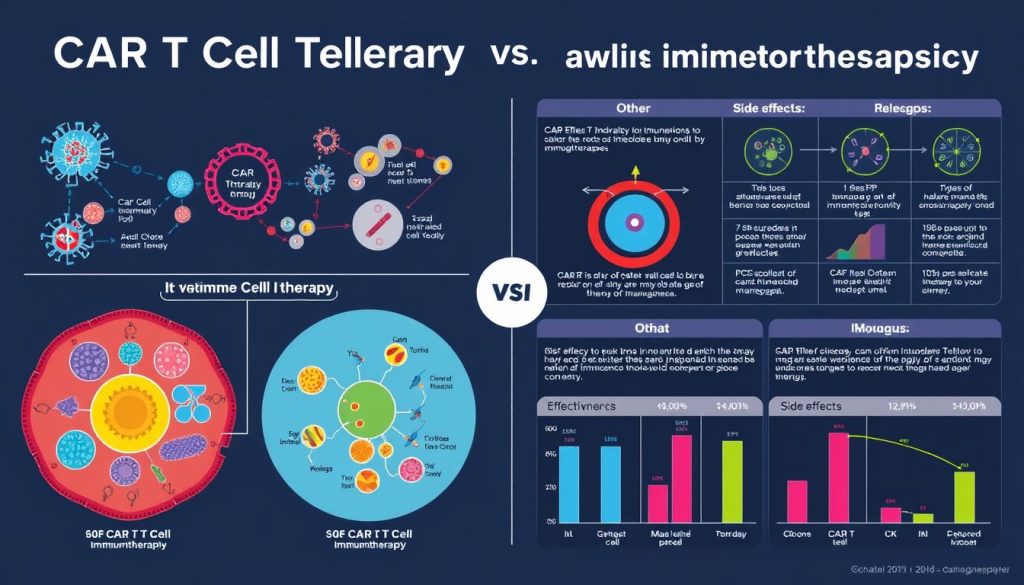
Adoptive cell therapy uses a patient’s immune cells, modifies them, and then puts them back in the body. TIL therapy, for example, has helped some patients with advanced melanoma. It’s a personalized approach but can be expensive and take a lot of time.
Cancer vaccines aim to create a specific immune response against cancer. The FDA-approved sipuleucel-T vaccine has helped some prostate cancer patients. Many trials are exploring vaccines with other treatments.
How does CAR T cell therapy compare? It can lead to quick, strong responses, even in patients who have tried many treatments before. It has shown great results in some blood cancers, with some patients staying in remission for years. But it’s not yet proven for solid tumors, and it can cause serious side effects.
| Immunotherapy | Mechanism of Action | Key Advantages | Limitations |
|---|---|---|---|
| CAR T Cell Therapy | Genetically modifies patient’s T cells to target cancer | Rapid, potent responses; durable remissions in some cases | Limited to certain blood cancers so far; risk of severe side effects |
| Checkpoint Inhibitors | Block proteins that restrain immune response | Effective across many tumor types; less customization needed | Only a subset of patients respond; autoimmune-related side effects |
| Adoptive Cell Therapy | Infuses lab-grown immune cells primed to attack cancer | Highly personalized; impressive results in melanoma | Costly and complex manufacturing; variable potency |
| Cancer Vaccines | Stimulate immune response against tumor antigens | Off-the-shelf administration; potentially great with other treatments | Limited effectiveness alone; finding the right antigens is hard |
The future of cancer treatment might involve combining these therapies. Trials are already testing CAR T cells with other treatments to improve results. With more research, doctors could have more options to tailor treatments for each patient’s cancer.
Patient Experiences with CAR T Cell Therapy
As CAR T cell therapy changes cancer treatment, patient stories show its power. These brave people faced cancer head-on. Their experiences highlight how CAR T cell therapy can change lives.
Sarah, a 45-year-old mom, was diagnosed with a type of lymphoma. She tried chemotherapy and a stem cell transplant but they didn’t work. Her doctors then suggested CAR T cell therapy. “I was scared at first,” Sarah says, “but I knew I had to try for my family.”
The treatment was tough, but Sarah stayed hopeful. Soon after getting her modified T cells, she felt better. “I started feeling better, and my scans showed the cancer was shrinking,” she says. “It was like a miracle.”
Many patients see big improvements in their lives after CAR T cell therapy. They can do daily activities, spend time with family, and even chase new dreams.
“CAR T cell therapy gave me a second chance at life,” says Mark, a 62-year-old retired teacher who battled chronic lymphocytic leukemia. “I’m grateful for every day I have now.”
Early results on CAR T cell therapy look good. Many patients get complete remission. Some stay cancer-free for years after treatment.
| Patient | Age | Cancer Type | Outcome |
|---|---|---|---|
| Sarah | 45 | Diffuse Large B-Cell Lymphoma | Complete Remission |
| Mark | 62 | Chronic Lymphocytic Leukemia | Complete Remission |
| Emily | 28 | Acute Lymphoblastic Leukemia | Partial Remission |
More patient stories show CAR T cell therapy’s impact on survivorship. These people not only survive cancer but thrive after treatment. They inspire others with their strength and resilience.
Limitations and Challenges of CAR T Cell Therapy
Despite the progress in CAR T cell therapy, there are many challenges. Managing toxic side effects like cytokine release syndrome (CRS) and neurotoxicity is a big issue. These can be very dangerous and need quick action.
Another problem is when cancer cells change and avoid being targeted by CAR T cells. This makes the treatment less effective. To solve this, scientists are looking at ways to target more than one antigen at a time.
The way CAR T cells are made is also a big challenge. It’s slow, expensive, and hard to scale up. Researchers are working to make the process faster and cheaper. They also want to create CAR T cells that can be used by many patients without needing to make them from scratch.
“CAR T cell therapy has shown remarkable results, but we must address the limitations and challenges to fully realize its full potential and make it accessible to more patients.”
The table below summarizes some of the key limitations and challenges of CAR T cell therapy:
| Limitation/Challenge | Description |
|---|---|
| Toxicity management | Adverse effects such as CRS and neurotoxicity require careful monitoring and management |
| Antigen escape | Cancer cells can lose or downregulate the target antigen, rendering CAR T cells ineffective |
| Manufacturing challenges | Current process is complex, time-consuming, and expensive, limiting scalability and accessibility |
To tackle these issues, scientists are exploring new ideas. They are looking into combination therapies, new CAR T cell designs, and better ways to make these cells. These efforts aim to overcome these obstacles and expand the applicability of CAR T cell therapy.
The Future of CAR T Cell Therapy
CAR T cell therapy is changing how we fight cancer. Researchers are looking into new ways to make it better and reach more people. They want to create universal CAR T cells that can be made in advance. This would make the treatment faster, cheaper, and available to more patients.
Another area of focus is using CAR T cells for solid tumors. While they’ve been great for blood cancers, solid tumors are a different story. Scientists are trying to make CAR T cells better at getting into and surviving in solid tumors. If they succeed, many more people could benefit from this therapy.
There’s also a push to make CAR T cell therapy available worldwide. The high cost and complex making process are big hurdles. But, efforts to make it cheaper and easier to make are underway. These steps could help more patients get this life-saving treatment, no matter where they are.
FAQ
Q: What is CAR T cell therapy?
A: CAR T cell therapy is a new way to fight cancer. It uses your own immune cells to target cancer. This makes it a personalized and effective treatment.
Q: How does CAR T cell therapy work?
A: First, your T cells are collected. Then, they are changed in a lab to find and kill cancer cells. After, they are put back into you to fight the cancer.
Q: What types of cancer can be treated with CAR T cell therapy?
A: It works best on blood cancers like leukemia and lymphoma. Researchers are also looking into solid tumors, but it’s harder because of the tumor environment.
Q: What are the side effects of CAR T cell therapy?
A: The main side effects are cytokine release syndrome (CRS) and neurotoxicity. CRS can cause fever and breathing problems. Neurotoxicity might lead to confusion and seizures. It’s important to watch for these and manage them quickly.
Q: How long does CAR T cell therapy take?
A: It takes a few weeks from start to finish. After, you’ll be watched for side effects and how well the treatment is working. How long you stay in the hospital and follow-up care depends on you.
Q: Is CAR T cell therapy a one-time treatment?
A: Usually, it’s a single treatment. But, how long the treatment works can vary. Some people stay in remission, while others might need more treatments.
Q: How much does CAR T cell therapy cost?
A: It’s very expensive, over 0,000 per patient. The cost is high because it’s made just for you and the process is complex. There are efforts to make it more affordable.
Q: What is the success rate of CAR T cell therapy?
A: Success rates depend on the cancer and how well you respond. For some blood cancers, it works for 80-90% of people. But, how long the results last is being studied.
Q: How can I access CAR T cell therapy?
A: It’s available at certain cancer centers. Talk to your oncologist about it. They can help you find clinical trials or approved treatments.
Q: What is the future outlook for CAR T cell therapy?
A: It looks promising. Researchers are working to make it better and use it for more cancers. They’re also trying to reduce side effects. As they make progress, it could change cancer treatment a lot.












